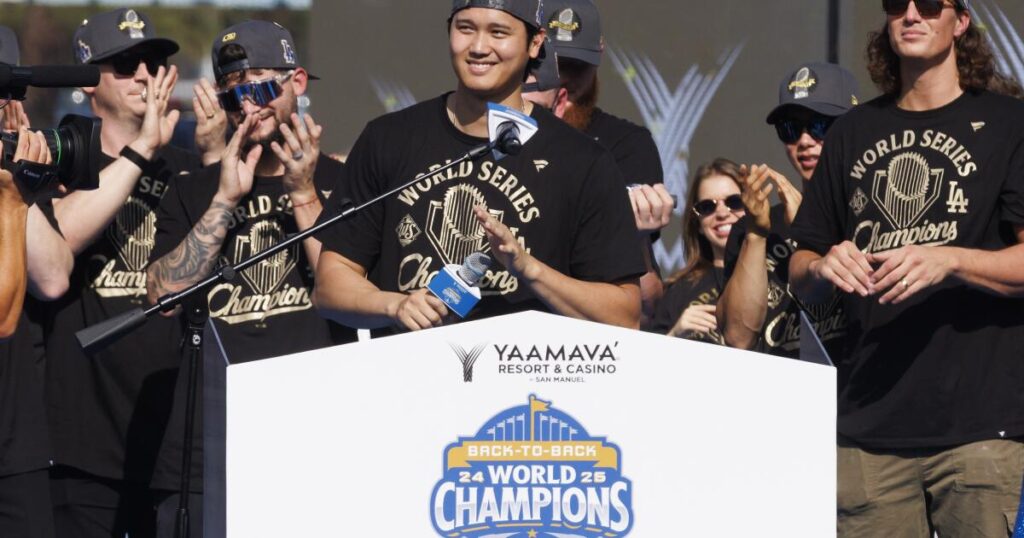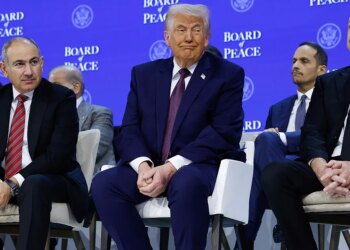LAS VEGAS — When it came to Major League Baseball’s history of the most valuable player award, there used to be Barry Bonds — then everyone else.
Over his 22-year career, Bonds won baseball’s highest individual honor a record seven times. Before this year, no one else had more than three.
But, like Bonds, accomplishing things no one else can has become the defining trait of Shohei Ohtani’s rise to superstardom.
And on Thursday, his career was elevated another notch higher, as he was named MVP for the fourth time by unanimous vote from the Baseball Writers Assn. of America to join Bonds in an exclusive club of winners with more than three.
“It’s an honor, of course,” Ohtani said in Japanese. “For me, being chosen unanimously was also very special.”
Like his three previous wins, which also came via unanimous vote, Ohtani was a virtual lock. As a hitter alone he led the National League by a wide margin in OPS (1.014) and slugging percentage (.622), was second in on-base percentage (.392) and, despite being outside the top 10 in batting average (.282, ranking 13th), set a career high with 55 home runs, trailing only Philadelphia’s Kyle Schwarber for the crown. His 7.5 wins above replacement, according to Fangraphs, just outpaced Arizona’s Geraldo Perdomo and Philadelphia’s Trea Turner for most in the league.
And then there was his pitching.
In perhaps the most impressive aspect of his season, Ohtani returned from a second Tommy John surgery — the kind of procedure only a handful of pitchers have fully rebounded from — and flashed almost every bit of his dominant form despite missing the previous year and a half on the mound.
In 14 starts he had a 2.87 ERA, the second-lowest of his career. And though his gradual buildup process meant he logged only 47 regular-season innings, he managed to strike out 62 batters, pumping 100-mph fastballs, big-bending sweepers and hard-biting splitters en route to playing a key part in the Dodgers’ postseason rotation.
“Because I was rehabbing from TJ and also had surgery on my left shoulder [last offseason], a lot of the focus was to be able to get back to the mound and be able to pitch,” Ohtani said. “So I think in that sense, this year the difficulty was more on the pitching side.”
The most impressive moments of Ohtani’s season came in the playoffs, when he helped the Dodgers to a second consecutive World Series title. He hit two home runs in the postseason opener. He authored an all-time performance in Game 4 of the National League Championship Series, hitting three home runs while striking out 10 over six scoreless innings to win NLCS MVP. He followed that up by collecting four extra-base hits and reaching safely a postseason-record nine times in the Dodgers’ 18-inning victory in Game 3 of the World Series.
Thursday’s MVP award, however, was a recognition of the production Ohtani posted to simply help the Dodgers reach October. It was a reminder of the sustained excellence he has maintained over the last half-decade. And it put him in territory only Bonds had occupied, as he continues to build his case for being the greatest player in history.
“The biggest thing is obviously being able to win the World Series, that’s first and foremost,” Ohtani said. “It’s icing on the cake to get an individual award and be crowned MVP. But I just really want to appreciate the support from all my teammates, everyone around me, my supporting staff.”
Before this season, Ohtani shared some select company as a three-time MVP. Two of his old Angels teammates, Mike Trout and Albert Pujols, had done it. So too had Yogi Berra, Roy Campanella, Joe DiMaggio, Mickey Mantle, Stan Musial, Jimmie Foxx, Mike Schmidt and Alex Rodriguez.
Only Bonds had surpassed that total. He won three MVPs in a four-year span early in his career (1990, 1992, 1993), then four straight (2001-04) during the height of his powers with the San Francisco Giants.
What Ohtani has done in his last five seasons, in which he has collected all four of his MVPs, rivals those stretches as perhaps the most dominant run MLB has seen.
There was his breakout campaign in 2021, when he proved his two-way capabilities could translate to the majors by amassing 46 home runs and 100 RBIs as a hitter, and a 3.18 ERA with 156 strikeouts as a pitcher. There was his encore in 2023, when he followed up a runner-up finish to Aaron Judge the previous year by posting his best offensive numbers (an American League-leading 44 home runs, MLB-best 1.066 OPS and his first .300 batting average) even in a year cut short by injuries.
Since signing with the Dodgers, Ohtani has kept it going.
Even without pitching last year, he won his third unanimous MVP by achieving MLB’s first 50-homer, 50-steal season while also setting career highs with 130 RBIs and a .310 batting average. That made him the first primary designated hitter to claim the honor, and he joined Frank Robinson as the second player to win MVP in both leagues.
This year there was once again little drama in the voting, as Ohtani edged fellow finalists Schwarber and Juan Soto of the New York Mets, who finished second and third, respectively.
“Obviously, I never strive to start off the season aiming to get the MVP,” Ohtani said. “At the end of the day, we want to be playing for a World Series. So I think the MVP just comes along with how you do during the season. If I’m playing well as an individual, that means I’m helping the team win.”
Given that Ohtani will return to a more normal pitching schedule next season, he almost certainly will enter 2026 as the MVP favorite once more. He will try to match another Bonds mark by winning the award in four consecutive years — and help the Dodgers complete a World Series three-peat.
“In that sense,” he said of aiding the team’s success, “hopefully I can end up with a couple more MVPs.”
“But at the end of the day,” he added, “it’s all about winning games.”
Really, over the last half-decade, he’s won at just about everything.
The post Shohei Ohtani wins fourth MVP award, joining Barry Bonds as only player with more than three appeared first on Los Angeles Times.




